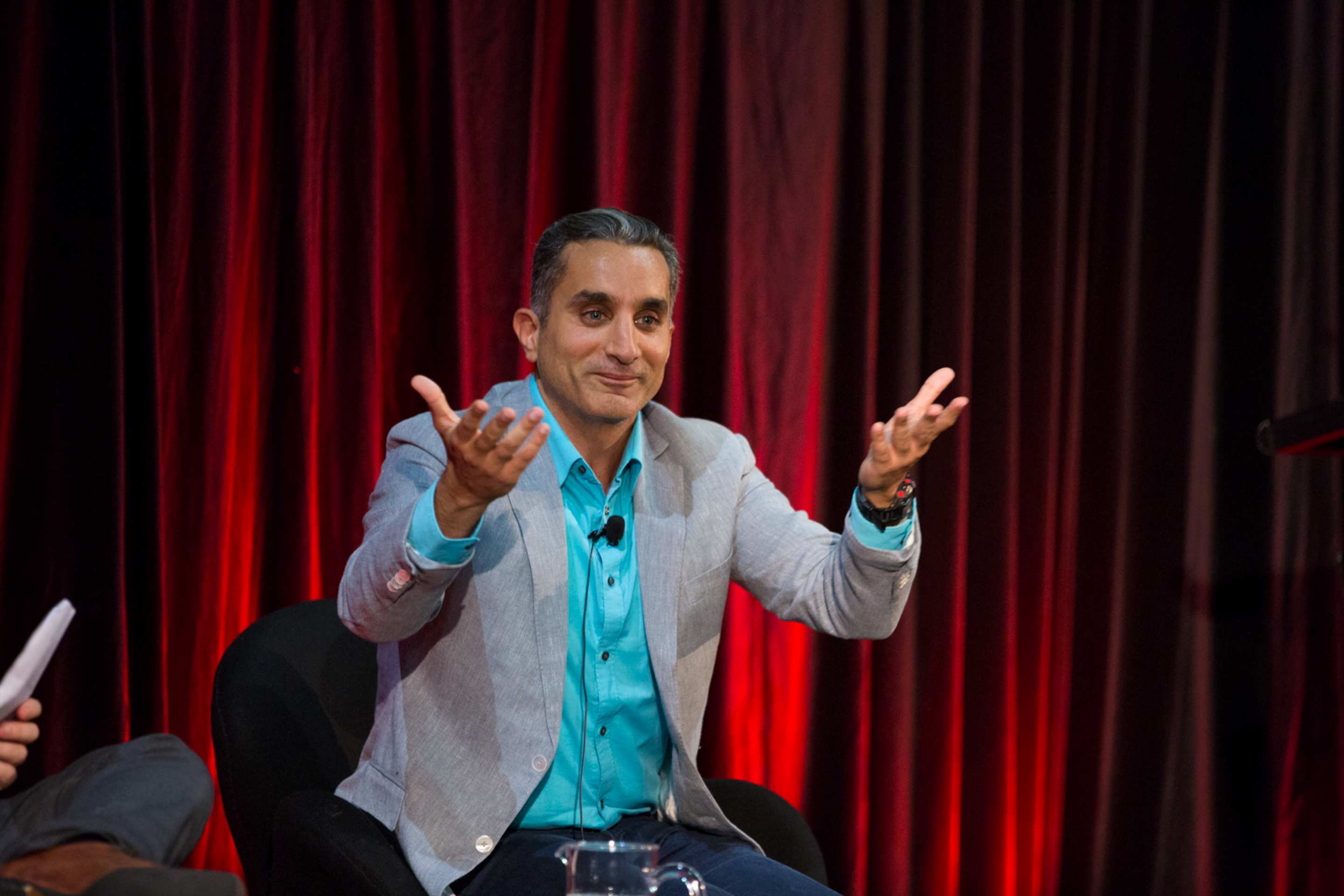
Political satirists aren't freedom fighters, says Bassem Youssef
The role of political satirists is simple: to 'bring more people to the table', renowned comedian and freedom-of-speech advocate Bassem Youssef told a packed MacLaurin Hall at the University of Sydney last week.

"This is what we do. We are not influencers of change. It's the people that make the change, not us."
In conversation with The Chaser's Chris Taylor, the Egyptian comedian – who shot to fame in 2012 as host and creator of satirical news show Al Bernameg – told the audience of more than 450 that comedy was an effective tool to involve more people in the political discussion.
"When people see political affairs done in a funny way, they're more involved. You can actually tell them about what congress or the parliament is doing to them and why it's wrong.
"But the role of the satirist ends just there … on the boundary of telling people our opinion. We are one product of a huge media market. Whatever happens afterwards, it's up to the people to make the change … to follow what they think is right.
"We are not freedom fighters, and we are not political leaders."
Youssef's 'Egypt's Daily Show' Al Bernameg was borne out of the Egyptian Arab Spring in early 2011.
Inspired by American comedian Jon Stewart, Youssef first produced a YouTube series of short clips mocking political events; after only nine episodes he was signed by a local TV network. A year later, when he and his team began filming the show in front of a live audience, it became a record-breaking hit, reaching more than 40 million viewers at its peak.
Throughout its three seasons, Al Bernameg won acclaim for its boldly humorous criticisms of Egypt's ruling powers, resulting in multiple lawsuits and threats against the show and its host.
In 2013, Youssef was named among the Time Magazine 100 Most Influential People in the World, was awarded the International Press Freedom Award, and named in Foreign Policy magazine's 100 Leading Global Thinkers.
Previously a surgeon, Youssef had attended injured protestors in makeshift clinics in Tahir Square during the revolution in 2011, but said he’d never thought of himself as "part" of the movement at the time.
"We didn't have any agenda in our minds as doctors, we were just fixing wounds. I didn’t know what would happen tomorrow. All I knew was that this was genuine," he told the audience.
After the revolution however, Youssef said he was infuriated by the ongoing "deceit, hypocrisy and lies" broadcast by State-owned media in the post-Mubarak era, so began producing his daring, satirical take on Egypt’s ruling elite, with the media itself a direct target.
"Media in Egypt is … inspired by people in power. The media circus is what gives you the material that you work with, because this is how they manipulate the masses.
"So basically, when you hit at them, you’re hitting at power in an indirect way."
After 'hitting at power' once too often, Youssef was issued an arrest warrant in March 2013. He turned himself in the next day and was questioned for five hours before being released on bail.
While agreeing the hotbed of the Egyptian revolution had proved fertile ground for a political satirist such as himself, he said it was nerve racking and jokingly admitted he would have had stomach ulcers if he had continued.
"Sometimes you would feel like doing something less dangerous…but I have absolutely no regrets.
"Most of my team were in their early twenties, and many of them would leave their home to come into the theatre against the will of their parents. It was an uphill fight making the show every time.
"After we were banned the first time, I told everybody, listen: 'I want you to know that our time in this theatre is limited, so we're going to go in and do the best jokes ever, and if they're going to shut us down, they're going to shut us down on our highest performance, not because we're afraid, because they're going to shut us down anyway'," Youssef explained to applause from the crowd.
"It was a daily event, people burning my picture outside the theatre, and we had to be inside writing jokes."
Despite the threats, the team used humour to rally together and even had bets on which skit would be their undoing.
"If you think about the threats it's a very crippling feeling. We liberated our fears and just went in and made the jokes."
However, in June 2014, someone won that bet, and the show was shut down. Soon after, Youssef, 41, left Egypt and now lives in Dubai with his wife and daughter. He lectures around the globe, and in 2015 served as a resident fellow at the John F Kennedy School of Government at Harvard’s Institute of Politics.
Read student blogger Perrin Walker's wrap up of the event on the Sydney Life blog.
Related articles
Sydney excels in national research engagement and impact assessment
